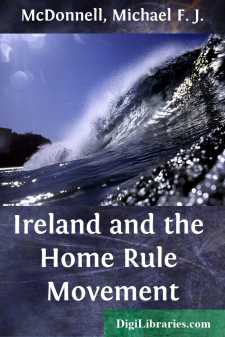Categories
- Antiques & Collectibles 13
- Architecture 36
- Art 48
- Bibles 22
- Biography & Autobiography 813
- Body, Mind & Spirit 142
- Business & Economics 28
- Children's Books 16
- Children's Fiction 13
- Computers 4
- Cooking 94
- Crafts & Hobbies 4
- Drama 346
- Education 46
- Family & Relationships 57
- Fiction 11829
- Games 19
- Gardening 17
- Health & Fitness 34
- History 1377
- House & Home 1
- Humor 147
- Juvenile Fiction 1873
- Juvenile Nonfiction 202
- Language Arts & Disciplines 88
- Law 16
- Literary Collections 686
- Literary Criticism 179
- Mathematics 13
- Medical 41
- Music 40
- Nature 179
- Non-Classifiable 1768
- Performing Arts 7
- Periodicals 1453
- Philosophy 64
- Photography 2
- Poetry 896
- Political Science 203
- Psychology 42
- Reference 154
- Religion 513
- Science 126
- Self-Help 84
- Social Science 81
- Sports & Recreation 34
- Study Aids 3
- Technology & Engineering 59
- Transportation 23
- Travel 463
- True Crime 29
Ireland and the Home Rule Movement
Categories:
Description:
Excerpt
INTRODUCTION
A decree of Pope Adrian IV., the only Englishman who has sat in the chair of St. Peter, in virtue of the professed jurisdiction of the Papacy over all islands, by a strange irony, sanctioned the invasion of Ireland by Strongbow in the reign of Henry II. Three years ago I stood in the crypt of St. Peter's in Rome, and the Englishman who was with me expatiated on the appropriate nature of the massive sarcophagus of red granite, adorned only with a carved bull's head at each of the four corners, which seemed to him to stand as a type of British might and British simplicity, and in which the sacristan had told us lay all that was mortal of Nicholas Breakspeare. Seeing that I took no part in this panegyric, he took me on one side and said that he had observed that all the English Protestants to whom he showed that tomb, situated as it is literally ad limina Apostolorum, waxed eloquent, but, on the other hand, the Irish Catholics whom he told that it contained the bones of the dead Pontiff invariably shook their fists at the ashes of the unwitting, but none the less actual, source of their country's ills. To this I replied by quoting to him a saying of Robert Louis Stevenson, who as a Scot viewed the matter impartially, and who declared "that the Irishman should not love the Englishman is not disgraceful, rather, indeed, honourable, since it depends on wrongs ancient like the race and not personal to him who cherishes the indignation."
The great tendency which has been so marked a [x]feature of Irish life in the course of the last decade to turn the attention of the people towards efforts at self-improvement and the development of self-reliance without regard to English aid, English neglect, or English opinion, excellent though it has been in every other respect, has had this one drawback—that there has grown up a generation of Englishmen, well-intentioned towards our country, to whom the problems of Irish Government are an unknown quantity. The ignorance of Irish affairs in England is due partly to ourselves, but also to a natural heedlessness arising from distance and preoccupation with problems with which Englishmen are more intimately concerned.
In view of the awakening of the democratic forces of Great Britain it is vital that Irish questions should be set before the eyes of the electorate of Great Britain, in order that, when for the first time the constitutional questions involved are placed before voters unprejudiced by class interests or a fellow-feeling for the pretensions of property wherever situate, there may be a body of electors who realise the gravity of the problems in question, and who have a full appreciation of the history of the case.
The Irish question has at no time been brought before the English public less than at the present day. Fenianism in the seventies and the various agrarian agitations in the eighties served to keep it constantly before the English eyes, and after the acquittal of Mr. Parnell and his colleagues of the charges brought against them by the Times much educative work was done for a short time by Irish Members of Parliament on English platforms....


